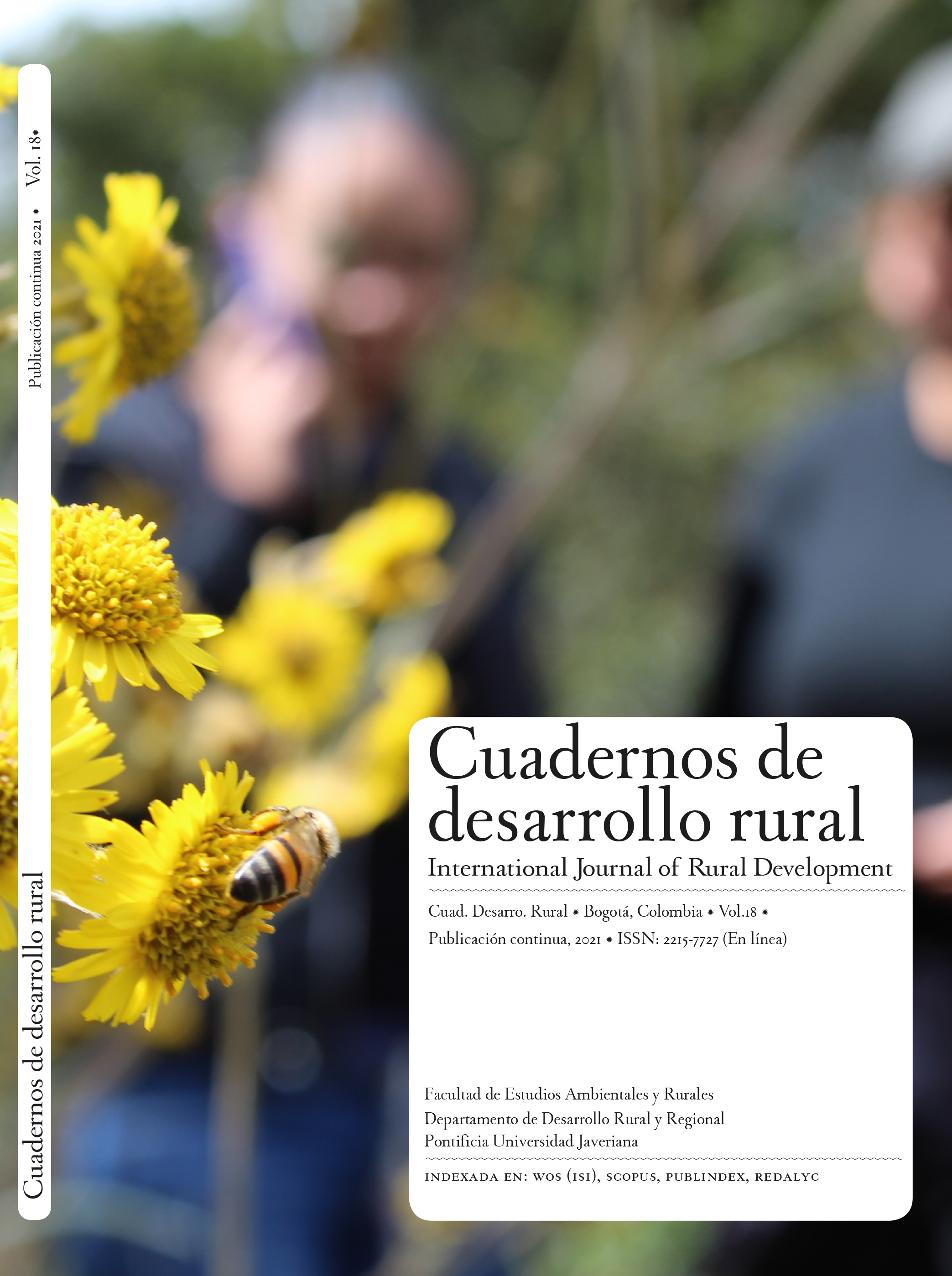Abstract
Rural extension programs are fundamental to promote local development in Latin America; however, few studies address their implementation. This study analyzed the technical bases of a Chilean public program and interviewed thirteen extensionists who implement it. It was found that professionals are adherent to technical visits as well as group trainings, and that emotional and pedagogical competencies are fundamental. The main facilitators of these actions are peer relationships and social commitment, while institutionalism is the most critical obstacle. The importance of addressing these factors to increase program quality is further discussed.
Bach-Mortensen, A., Lange, B., & Montgomery, P. (2018). Barriers and facilitators to implementing evidence-based interventions among third sector organizations: a systematic review. Implementation Science, 13(1),103. doi: 10.1186/s13012-018-0789-7.
Berkel, C., Mauricio, A., Schoenfelder, E., & Sandler, I.N. (2011). Putting the pieces together: An integrated model of program implementation. Prevention Science, 12(1), 23-33. doi: 10.1007/s11121-010-0186-1.
Braun, V., & Clarke, V. (2006). Using thematic analysis in psychology. Qualitative Research in Psychology. Qualitative Research in Psychology, 3(2),77-101.
Dane, A. V., & Schneider, B. H. (1998). Program integrity in primary and early secondary prevention: Are implementation effects out of control? Clinical Psychology Review, 18, 23–45.
Durlak, J., & DuPre, E. (2008). Implementation matters: A review of research on the influence of implementation on program outcomes and the factors affecting implementation. American Journal of community psychology, 41(3-4), 327-350. doi: 10.1007/s10464-008-9165-0.
Dusenbury, L., R. Brannigan, Falco, M., & Hansen, W.B. (2003). A review of research on fidelity of implementation: implications for drug abuse prevention in school settings. Health education research, 18(2), 237-256.
Eraut, M. (2004). Informal learning in the workplace. Studies in Continuing Education, 26(2), 247-73. doi: 10.1080/158037042000225245
Escribano, S., A. Morales, M. Orgilés, y J.P. Espada. (2015). Influencia de la fidelidad de la implementación en la eficacia de un programa de promoción de la salud sexual con adolescentes. Health and Addictions/Salud y Drogas, 15(2), 103-114. doi: 10.21134/haaj.v15i2.242
FAO y BID. (2016). Estrategias, reformas e inversiones en los sistemas de extensión rural y asistencia técnica en América del Sur. Lima: Autores.
Flick, U. (2018). An introduction to qualitative research (5ta ed.). Los Ángeles: Sage Publications Limited.
Franz, N., M. Arnold, & Baughman, S. (2014). The role of evaluation in determining the public value of extension. Journal of Extension, 52(4). Disponible en: www.joe.org/joe/2014august/comm3.php
Gázquez, M., García del Castillo, J., & Ruiz, I. (2011). Importancia de la fidelidad de la implementación en la implementación de programas escolares para prevenir el consumo de drogas. Health and Addictions, 11(1), 51–69.
Instituto Nacional de Desarrollo Agropecuario (INDAP). (2017). Normas técnicas y procedimientos operativos del Programa de Desarrollo Local (PRODESAL).
Instituto Nacional de Desarrollo Agropecuario, INDAP. 28 de diciembre del 2018. INDAP en cifras. Disponible en: https://www.indap.gob.cl/biblioteca/documentos-indap/!k/indap-en-cifras-primer-semestre-2018
Kakeeto, M., Lundmark, R., Hasson, H., & von Thiele Schwarz, U. (2017). Meeting patient needs trumps adherence: A cross-sectional study of adherence and adaptations when national guidelines are used in practice. Journal of Evaluation in Clinical Practice, 23(4), 830-838. doi: 10.1111/jep.12726
Klerkx, L., Landini, F., & Santoyo, H. (2016). Agricultural extension in Latin America: current dynamics of pluralistic advisory systems in heterogeneous contexts. The Journal of Agricultural Education and Extension, 22(5), 389-397. doi: 10.1080/1389224X.2016.1227044
Lamm, A., Israel, G., & Diehl, D. (2013). A national perspective on the current evaluation activities in extension. Journal of Extension, 51(1). Disponible en: www.joe.org/joe/2013february/a1.php
Landini, F., Murtagh, S., & Lacanna, M. (2009). Aportes y reflexiones desde la psicología al trabajo de extensión con pequeños productores. Buenos Aires: Ediciones INTA.
Landini, F. (2016). How to be a good rural extensionist. Reflections and contributions of Argentine practitioners. Journal of Rural Studies, 43, 193-202. doi:10.1016/j.jrurstud.2015.11.014
McLeod, B. D., Sutherland, K., Martinez, R., Conroy, M., Snyder, P., & Southam-Gerow, M. (2017). Identifying common practice elements to improve social, emotional, and behavioral outcomes of young children in early childhood classrooms. Prevention Science, 18(2), 204-213. doi: 10.1007/s11121-016-0703-y.
Nilsen, P. (2015). Making sense of implementation theories, models, and frameworks. Implementation Science, 10(53), 5-12.doi: 10.1186/s13012-015-0242-0
Perepletchikova, F. (2011). On the topic of treatment integrity. Clinical Psychology: Science and Practice, 18, 148–153. doi: 10.1111/j.1468-2850.2011.01246.x
Pérez, D., Van der Stuyft, P., del Carmen Zabala, M., Castro, & Lefèvre, P. (2016). A modified theoretical framework to assess implementation fidelity of adaptive public health interventions. Implementation Science, 11(1), 91.doi: 10.1186/s13012-016-0457-8.
Rojas-Andrade, R., Leiva, L., Vargas, B., & Squicciarini, A. (2017). Efectos de la fidelidad de la implementación sobre los resultados de una intervención preventiva en salud mental escolar: un análisis multinivel. Revista Intervención Psicosocial, 26, 147-154. Doi: 10.1016/j.psi.2016.12.002
Rojas-Andrade, R., & Leiva, L. (2018). Is Implementation Fidelity Important? A Systematic Review on School-Based Mental Health Programs. Contemporary School Psychology. doi: 10.1007/s40688-018-0175-0
Rojas-Andrade, R., Keller, K., & Prosser, G. (2019). Análisis de discurso del Programa chileno de extensión rural PRODESAL: de campesinos a empresario agrícolas. Selis, D. (Eds.). Actas de XIX Jornadas Nacionales de Extensión Rural y XI del Mercosur (586-602). Mendoza, Argentina: Asociación Argentina de Extensión rural.
Schulte, A., Easton, J., & Parker, J. (2009). Advances in treatment integrity research: Multidisciplinary perspectives on the conceptualization, measurement, and enhancement of treatment integrity. School Psychology Review, 38(4).
Schultes, M., Jöstl, G., Finsterwald, M., Schober, B., & Spiel, C. (2015). Measuring intervention fidelity from different perspectives with multiple methods: The Reflect program as an example. Studies in Educational Evaluation, 47, 102–112. Doi: 10.1016/j.stueduc.2015.

This work is licensed under a Creative Commons Attribution 4.0 International License.
Copyright (c) 2021 Karina Keller Santander, Licenciada, Fernando Landini, Doctor, Rodrigo Miguel Rojas-Andrade, Doctor, Gabriel Prosser Bravo, Licenciado



